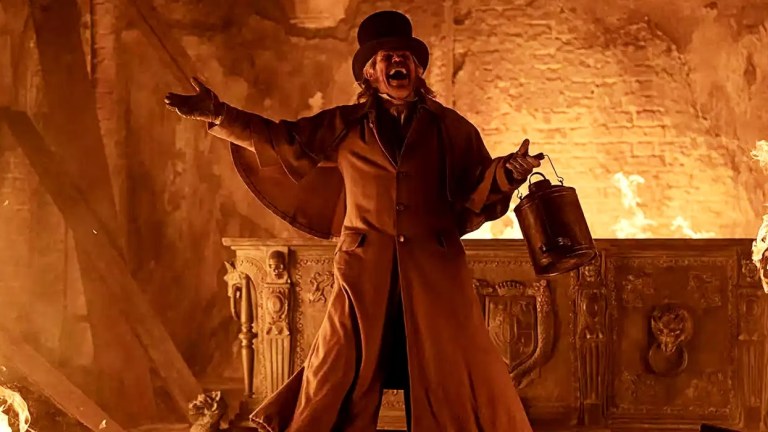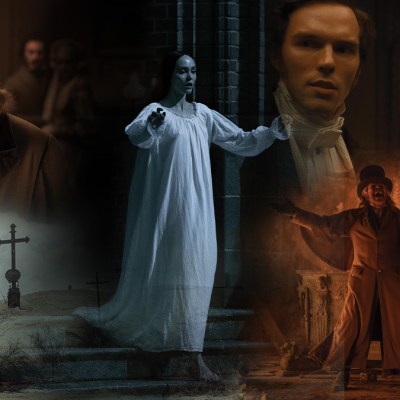Nosferatu: How Robert Eggers Came Up With Willem Dafoe’s “Occultist” Vampire Hunter
Exclusive: Robert Eggers reveals why Willem Dafoe was so eager to play a Van Helsing-like character in the new Nosferatu, as well as this version’s real world influences.

Willem Dafoe has a history with Nosferatu. Long before appearing in Robert Eggers’ reimagining of the German Expressionist classic, the Oscar-nominated actor starred in a film about the making of the original vampire movie. In fact, one of the Oscars he was nominated for was the movie about Nosferatu—or at least a fantasy version of it where Dafoe played a literal vampire who is cast by eccentric director F.W. Murnau (John Malkovich) to provide authenticity to the 1922 picture.
Willem Dafoe’s performance in Shadow of the Vampire (2000) had a formative influence on Eggers too. Albeit the way Eggers tells it, it was something he and Dafoe rarely discussed while mounting their own interpretation of the real Murnau’s influential film.
“I think he’s always kind of trying to not engage with that question just because they’re different films,” Eggers says when we ask if he and Dafoe discussed the differences between the actor’s eponymous character in Shadow of the Vampire and the one played by Bill Skarsgård in the new Nosferatu. “But, you know, he’s familiar with the material and he likes it.”
With that said, Shadow of the Vampire obviously made an impact on Eggers, who still recounts how it was “a very important movie to me” while growing up. And to this day, the director is a little bemused that he’s developed a rich working relationship with Dafoe that now spans three films, including The Lighthouse (2019) and The Northman (2022). That might also be why Dafoe was so happy to sign onto another vampire film, and one in which he at last gets to play a vampire hunter… as well as what seems to be Eggers’ favorite character.
“Willem basically said [to me], I know that’s the role you would want to play if you were in the movie, so I’m happy to do it,” Eggers says with a chuckle. And when you see the movie, it makes sense.
In Eggers’ Nosferatu, Dafoe plays a character whom Eggers has added to Murnau’s original version of the story: Albin Eberhart Von Franz. By his name alone, viewers might pick up that Von Franz is a variation on the Abraham Van Helsing character from Bram Stoker’s original Dracula novel, which all versions of Nosferatu draw from. However, unlike Stoker’s noble polymath doctor, who is often depicted in film and literature as a force of Christian morality with a crucifix in hand, Dafoe’s Von Franz finds solutions for fighting vampires that are more acutely occult.
It’s a distinction that makes all the more sense once you realize he is named after Albin Grau—the producer and set designer on the original Nosferatu who came up with the idea of making a vampire film inspired by Dracula—and Jungian psychologist Marie-Louise von Franz.
“[Dafoe’s] Von Franz has early-to-mid 19th century learned occult knowledge,” Eggers explains, “and I was thinking about Albin Grau, who was a practicing occultist.” According to the director, much of the folklore and literature that inspired Grau is applied to Dafoe’s Von Franz. Also like the real-life Grau, Von Franz is a natural true believer.
Says Eggers, “Even though he had some salacious stories when he was doing press that was a little bit cartoony, I think Albin Grau probably did believe in the existence of vampires or psychic vampires.” Indeed, the real Grau was born in 1884 and remained distinctly shaped by the 19th century throughout his life—this included when he told the press in 1922 that he came upon the idea of making a vampire movie after meeting a Serbian farmer during the First World War. At the time, Grau was serving in the German Army and the farmer, the filmmaker later alleged, told Grau that his father had risen from the grave to feed on the blood of their community.
Whether true or not, Grau certainly had a keen interest in the occult. After the war, he co-founded the studio Prana Film, whose first movie was Nosferatu. And “Prana” is a Sanskrit word that roughly translates to “the life-giving breath.” Grau also joined multiple occult societies throughout his lifetime, including the Order of the Oriental Templars, and counted the infamous Aleister Crowley as among his contemporaries and associates. It is likely Grau’s fixation with the supernatural inspired the premise of Shadow of the Vampire, even as like most filmmaking stories, that movie transfers all the credit to the director.
So things appear to be coming full circle with Dafoe now playing a version of both Grau and Van Helsing; a professor as influenced by the metaphysical as he is the scientific world, and an occultist who uses his knowledge for good. You could see why anyone would want to play that.
Nosferatu opens in theaters on Dec. 25. You can read our full Den of Geek magazine cover story on the film here.


